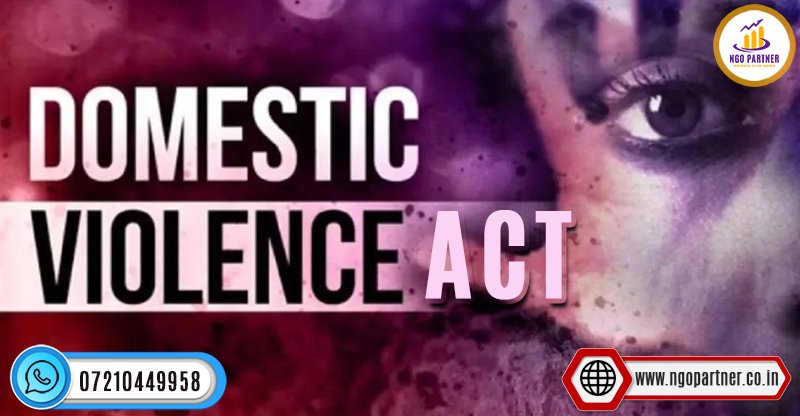
- June 20, 2023
- NGO Partner
- 0 Comments
- 2158 Views
- 0 Likes
- Marketing Company Blogs
Domestic Violence Act 2005
Domestic Violence
Domestic violence is a grave social issue that affects millions of individuals worldwide. It refers to any form of abuse, be it physical, emotional, sexual, or psychological, occurring within the realm of intimate relationships. The impact of domestic violence is profound, causing immense physical and emotional harm to victims and disrupting the fabric of families and communities.
Table of Contents
ToggleTo combat this pervasive problem, governments enact legislation such as the Domestic Violence Act, which aims to provide legal protection and support for victims, hold perpetrators accountable, and promote a society free from violence. The Domestic Violence Act outlines the rights of survivors, establishes mechanisms for obtaining protection orders, and outlines the responsibilities of authorities and support services.

Addressing domestic violence is of paramount importance for several reasons. Firstly, it upholds the fundamental human rights of individuals, ensuring their safety, dignity, and well-being. Secondly, combating domestic violence contributes to the creation of healthier, more equitable relationships and communities. Lastly, addressing domestic violence is crucial for breaking the cycle of abuse and fostering a society that values respect, equality, and non-violence.
In this blog, we will delve deeper into the definition and scope of domestic violence, explore the key provisions of the Domestic Violence Act, and emphasize the significance of addressing domestic violence in our society. By raising awareness, understanding the legal framework, and promoting support systems, we can work together towards eradicating domestic violence and creating a safer, more compassionate world for all.
Helpline Number: +91-7669001136
Understanding Domestic Violence
Types and Forms of Domestic Violence
Domestic violence manifests in various types and forms, extending beyond physical abuse. It includes emotional, psychological, sexual, and economic abuse. Emotional abuse involves belittling, threats, intimidation, and controlling behavior. Psychological abuse undermines the victim’s self-worth and mental well-being. Sexual abuse encompasses non-consensual acts, marital rape, and sexual coercion. Economic abuse involves controlling finances and limiting the victim’s access to resources.
Dynamics and Factors Contributing to Domestic Violence
Domestic violence is a complex issue influenced by multiple factors. Power imbalances, gender inequality, and societal norms that perpetuate patriarchy contribute to its occurrence. Factors like substance abuse, stress, and intergenerational patterns of violence can exacerbate the dynamics of abuse. Additionally, cultural beliefs, lack of awareness, and social stigma often prevent victims from seeking help.
Impact on Victims and Society
The impact of domestic violence extends far beyond the immediate victims. Survivors often suffer from physical injuries, mental health disorders, and low self-esteem. The trauma can affect their ability to maintain healthy relationships, work, and engage in society. Domestic violence also has detrimental consequences for children who witness or experience it, leading to long-term emotional and psychological issues. Furthermore, the social and economic costs of domestic violence are significant, including healthcare expenses, lost productivity, and strain on social welfare systems.
Key Provisions of the Domestic Violence Act
Definition of Domestic Violence
The Domestic Violence Act provides a comprehensive definition of domestic violence, encompassing various forms of abuse mentioned earlier. It recognizes the rights of victims and aims to protect them from all forms of violence within intimate relationships.
Rights and Protection Measures for Victims
The Act ensures several rights for victims, such as the right to live free from violence, the right to secure housing, the right to financial support, and the right to obtain protection orders against the perpetrator. It also establishes protective measures like restraining orders and residence orders to ensure the safety and well-being of victims.
Role of Protection Officers and Support Services
The Act assigns the responsibility of providing support and assistance to victims to designated Protection Officers. These officers guide victims through the legal processes, assist in filing complaints, and facilitate access to support services such as shelters, counseling, and medical assistance. They play a crucial role in empowering victims and connecting them with the resources they need to break free from the cycle of abuse.
Legal Remedies and Processes
Filing Complaints and Seeking Protection Orders
The Domestic Violence Act outlines the procedures for victims to file complaints and seek protection orders from the court. It ensures that victims have access to legal remedies swiftly and effectively, allowing them to obtain immediate protection from their abusers.
Role of Police and Judiciary in Domestic Violence Cases
The Act mandates that law enforcement agencies respond promptly and sensitively to domestic violence cases. It emphasizes the importance of thorough investigation, collection of evidence, and cooperation with other agencies to ensure justice. The judiciary plays a critical role in adjudicating domestic violence cases, providing remedies, and enforcing protection orders.
Supportive Legal Services and Counseling
Victims of domestic violence often require legal aid and counseling to navigate the legal processes and heal from the trauma. The Act promotes the provision of supportive legal services, including pro bono representation, to ensure access to justice. Additionally, counseling services are essential to help survivors cope with the emotional and psychological aftermath of abuse.
By understanding the dynamics of domestic violence, recognizing the key provisions of the Domestic Violence Act, and comprehending the legal remedies available, we can collectively work towards preventing and addressing this pervasive issue. Through awareness, support, and effective implementation of the Act, we can strive to create a society where everyone
Prevention and Intervention Strategies
Awareness and Education Programs
Raising awareness about domestic violence is crucial to prevent its occurrence and promote early intervention. Educational programs can be implemented in schools, community centers, and workplaces to educate individuals about the signs of domestic violence, its impact, and available resources. These programs also focus on promoting healthy relationships, gender equality, and non-violent conflict resolution.
Supportive Services for Victims
Providing comprehensive support services is essential for victims of domestic violence. This includes immediate assistance such as emergency shelters, medical care, and legal aid. Long-term support involves counseling, therapy, and empowerment programs to help survivors rebuild their lives and regain independence. These services should be accessible, culturally sensitive, and tailored to meet the diverse needs of survivors.
Rehabilitation and Counselling for Perpetrators
Addressing domestic violence also requires intervention programs for perpetrators. Rehabilitation programs aim to address the root causes of abusive behavior, promote accountability, and facilitate behavioral change. Counseling and therapy sessions can help perpetrators develop healthier coping mechanisms, empathy, and non-violent communication skills, breaking the cycle of violence.
Support Systems and Resources
Shelters and Safe Houses
Safe and secure shelters are essential for victims fleeing abusive environments. These shelters provide temporary accommodation, safety measures, and support services to ensure the well-being of survivors and their children. Collaborations between NGOs, government agencies, and community organizations can expand the availability and accessibility of shelters.
Helplines and Support Networks
Helplines play a critical role in providing immediate assistance, counseling, and information to victims of domestic violence. They offer a confidential and anonymous platform for individuals to seek help, report abuse, and access resources. Support networks, both online and offline, create a sense of community and solidarity, allowing survivors to connect, share experiences, and receive emotional support.
Collaboration with NGOs and Government Agencies
Building strong partnerships between NGOs, government agencies, and community organizations is crucial in combating domestic violence. Collaboration enhances the effectiveness of prevention programs, support services, and policy advocacy. Sharing resources, expertise, and best practices can lead to a comprehensive and coordinated response to domestic violence.
Challenges and Solutions
Social Stigma and Victim Blaming
Societal attitudes and misconceptions surrounding domestic violence often result in victim blaming and reluctance to report abuse. Overcoming social stigma requires a multi-faceted approach involving public awareness campaigns, education, and promoting a culture of empathy and support. Engaging influential community leaders, media, and celebrities can help challenge harmful stereotypes and create a safer environment for survivors.
Access to Justice and Legal Aid
Ensuring access to justice is crucial for survivors seeking legal remedies. Many survivors face barriers such as lack of legal knowledge, financial constraints, and fear of retaliation. Increasing access to free or affordable legal aid services, providing information about legal rights, and streamlining the legal process can help survivors navigate the judicial system with confidence.
Strengthening Implementation and Enforcement
Effective implementation and enforcement of domestic violence laws are vital for protecting survivors and holding perpetrators accountable. This requires continuous training for law enforcement agencies, judges, and legal professionals on domestic violence issues. Regular monitoring, evaluation, and strengthening of institutional mechanisms can address gaps in implementation, ensuring a more robust response to domestic violence.
In conclusion, the Domestic Violence Act serves as a powerful tool in addressing and combating the pervasive issue of domestic violence. It recognizes the rights of victims, provides protection measures, and outlines legal remedies for survivors. Through awareness, education, and the provision of support services, we can empower victims, hold perpetrators accountable, and break the cycle of violence. Collaboration between NGOs, government agencies, and support networks is crucial for creating a safer and more supportive environment for survivors. By advocating for policy changes, challenging social stigmas, and strengthening implementation, we can work towards a society where domestic violence is not tolerated, and the rights and well-being of every individual are protected. Together, let us stand against domestic violence and strive for a future free from abuse.



Leave a Comment